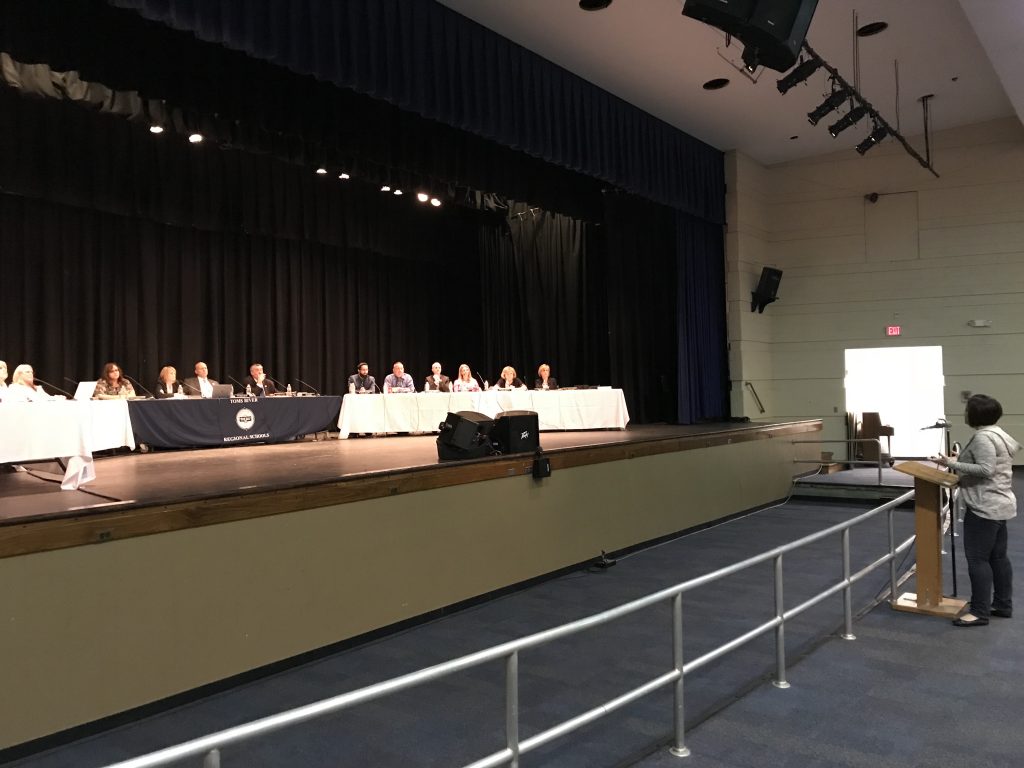
A parent addresses the Toms River Regional school board, March 27, 2018. (Photo: Daniel Nee)
It was an Instagram post that terrified students, angered parents, and evolved into a public debate in Toms River as to how students who make threats against others are handled by the regional school district.
The post, made by an intermediate level student, pictured the minor with what appeared to be a gun, accompanied by the text: “Toms River ouhh where we pull the trigger.” The post came weeks after the Feb. 14 massacre at a high school in Parkland, Fla., where a teen gunman killed 17 students.
The Toms River student, whose identity has not been divulged by authorities due to his age, was questioned by police, who determined the threat was “not credible.” The student had been suspended after the incident, and it is not known if he has returned to school. Regardless of the student’s status with the district, dozens of parents turned out Wednesday night at a Board of Education meeting to question officials as to what, exactly, must occur before a student is transferred out of the district.
“There is very specific investigating and reporting procedures, and that’s all I’m going to say,” said Assistant Superintendent Debra L. McKenna.
“How many strikes are too many strikes against that child?” asked one parent who did not provide his name, pressing school officials on the issue of the expulsion of students to an alternative school due to threats. “When does the district require to make alternative education available, whoever it may be?”
Superintendent David M. Healy said the district’s policies toward meting out discipline are lengthy and often complicated.
“There are policies regarding student suspension, assaults, incidents involving weapons and general student conduct,” he said.
On when a student should be removed from the school district: “The time is when that child is no longer considered suitable for the environment or the environment is no longer considered suitable for that child.”
Healy said that while the process for expelling a student depends on numerous factors, the decision is not “interpretive.”
“There is a whole clinical evaluation that takes place,” said Healy. “We have clinicians in our buildings and we deal collectively with law enforcement.”
Weapons offenses, he said, are the most serious the school district deals with.
“To really answer your question, if there’s a child that’s deemed to be a risk to himself or others, and doesn’t belong in that educational environment, that child will not be allowed in that educational environment,” Healy told one parent. “There are certain black-and-white issues where we take direct action, but it’s not one person making the decision. It’s a number of people.”
The district, he said, utilizes the services of Preferred Behavioral Health, a private firm, to help with psychiatric evaluations and “a number of people” are involved in the decision-making process. If a student is suspended due to a threat – or any reason – he or she will be given extra attention if returned to school.
“If a child is even considered to come back to school, there is a comprehensive plan put into place before they even come back here,” said Healy.
Parents also relayed anecdotes of situations where they were able to gain access to school buildings without showing identification. The parents’ accounts were often met sternly, with officials pleading that stories of security issues be kept confidential in order to ensure school safety. The district, later this year, is planning to present taxpayers with a referendum that will include millions of dollars worth of security upgrades for district facilities.
School board members have unique access to confidential information on troubled students. It is not uncommon for boards to vote in closed session meetings on whether to suspend or expel students. The board members are legally prohibited from divulging the information, but can speak in generalities about the process.
“I don’t think any child is an immediate threat,” said board member Daniel Leonard, at Wednesday night’s meeting.
One parent said that while concerns over security and access to schools are valid, the district is being unfairly criticized.
“I think a lot of the secretaries, and even a lot of the teachers, are feeling they’re getting a bad rap,” said Jennifer Howe, adding that she has always been required to show identification when visiting a school her children attend.
At similar school board meetings across the country, parents have been asking similar questions, especially in light of the fact that the Florida school shooter, Nikolas Cruz, 18, was the subject of police calls to his home and had posted threats online before carrying out the gruesome crime.
Healy said Toms River handles threats in a “complex and involved” process, but does so with student safety in mind.
“If there is a student who’s considered a danger to anyone in this district – staff, students, parents – they’re not going to be allowed back,” said Healy. “I have three daughters in school myself, and I can tell you I care for these kids as if they were my own.”


Police, Fire & Courts
Toms River Police Catch Well-Known Suspect Attempting to Burglarize Vehicles

Police, Fire & Courts
Fatal Toms River Hit-and-Run Results in Charges Against Local Man, 68

Police, Fire & Courts
Foursome Accused of Dismembering Body Following Murder of Toms River Man







